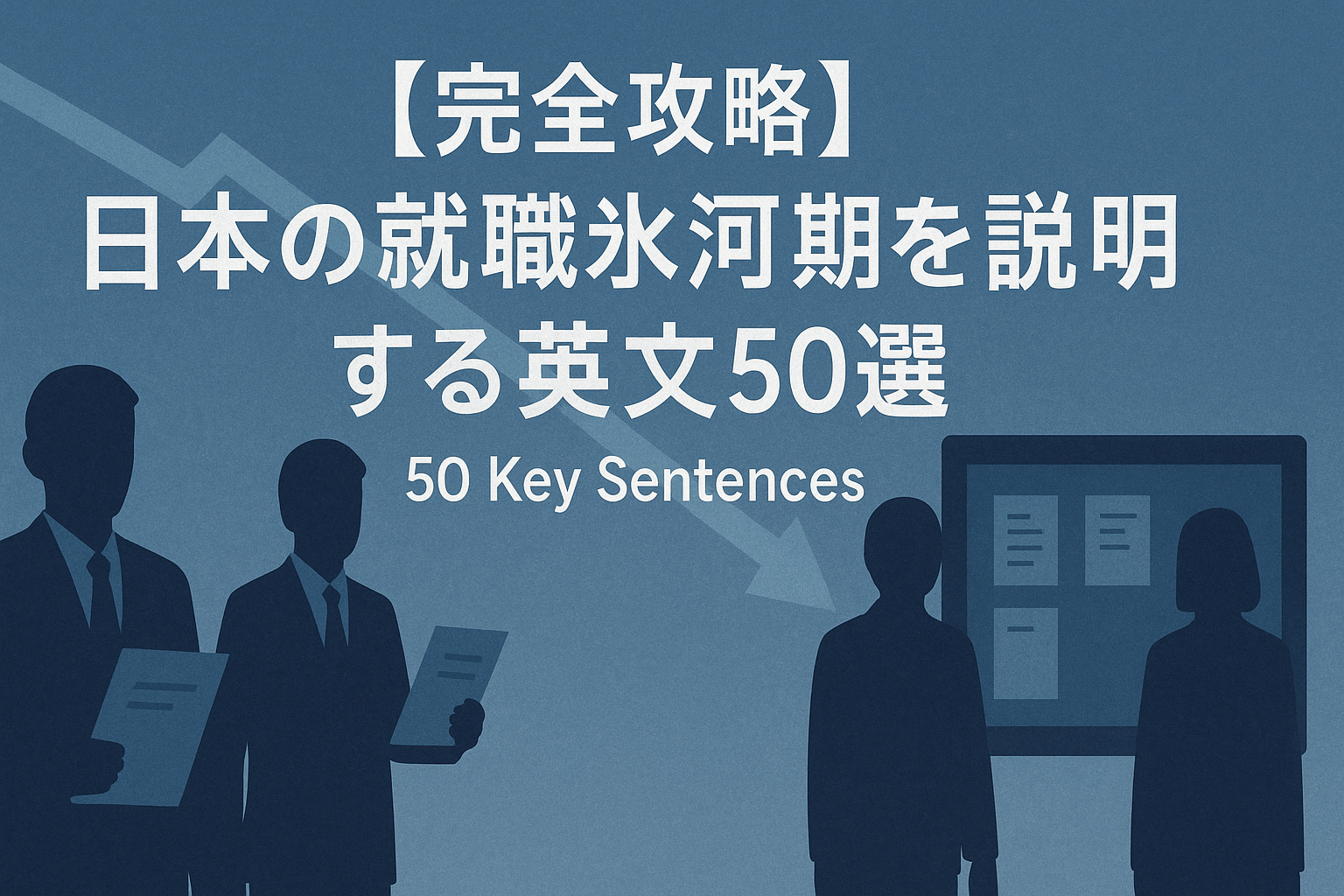今回は日本の就職氷河期を説明する英文50選を、時代別・問題別に整理してお届けします。
外国人の友人や同僚から
「日本の就職氷河期って何?」
「なぜ日本の若者は就職できなかったの?」「その世代は今どうなっているの?」
と聞かれた時、うまく説明できればスマートですね!
また、英語を抜きにしても、単純な知識の整理として役に立つはずです。
一緒に確認していきましょう!
基本的な就職氷河期用語
| 日本語 | 英語 |
|---|---|
| 就職氷河期 | Employment Ice Age |
| 氷河期世代 | Ice Age Generation |
| 就職難 | Job shortage / Employment crisis |
| 新卒採用 | Fresh graduate recruitment |
| 非正規雇用 | Non-regular employment |
| フリーター | Freeter (part-time worker) |
| ニート | NEET (Not in Education, Employment, or Training) |
| 派遣社員 | Temporary worker / Dispatch worker |
| 契約社員 | Contract employee |
| 終身雇用 | Lifetime employment |
| 年功序列 | Seniority-based system |
| ロストジェネレーション | Lost Generation |
日本の就職氷河期説明英文50選
基本概念・時代背景(10文)
1. 就職氷河期の定義
- “Japan’s Employment Ice Age refers to the period from the early 1990s to mid-2000s when job opportunities for new graduates drastically decreased.” (日本の就職氷河期は1990年代前半から2000年代半ばにかけて新卒者の就職機会が劇的に減少した時期を指します。)
- “The term ‘Ice Age Generation’ describes people born between 1970-1982 who faced severe employment difficulties during their job-hunting years.” (「氷河期世代」という用語は1970年から1982年生まれで、就職活動時期に深刻な雇用困難に直面した人々を表します。)
- “This employment crisis coincided with Japan’s economic recession following the collapse of the bubble economy.” (この雇用危機は、バブル経済崩壊後の日本の経済不況と時期を同じくしました。)
2. 経済的背景
- “The bursting of Japan’s asset price bubble in 1991 triggered a prolonged economic downturn that lasted over a decade.” (1991年の日本の資産価格バブル崩壊は、10年以上続く長期の経済低迷を引き起こしました。)
- “Corporate restructuring and cost-cutting measures led to a significant reduction in new graduate hiring.” (企業のリストラとコスト削減措置により、新卒採用が大幅に削減されました。)
- “The Japanese government’s delayed response to the economic crisis worsened the employment situation.” (経済危機に対する日本政府の対応の遅れが雇用状況を悪化させました。)
3. 社会的影響
- “The employment crisis fundamentally changed Japan’s traditional hiring practices and career expectations.” (雇用危機は日本の伝統的な採用慣行とキャリア期待を根本的に変えました。)
- “Many young people were forced to accept non-regular employment or remained unemployed for extended periods.” (多くの若者が非正規雇用を受け入れるか、長期間失業状態に置かれることを余儀なくされました。)
- “The concept of ‘lifetime employment’ began to erode as companies adopted more flexible hiring practices.” (企業がより柔軟な採用慣行を採用するにつれて、「終身雇用」の概念が崩れ始めました。)
- “Social phenomena like ‘freeters’ and ‘NEETs’ emerged as young people struggled to find stable employment.” (若者が安定した雇用を見つけるのに苦労する中で、「フリーター」や「ニート」などの社会現象が現れました。)
雇用市場の変化(10文)
4. 採用数の激減
- “The job opening-to-applicant ratio for new graduates fell to historic lows during the peak of the employment crisis.” (雇用危機のピーク時には、新卒者の求人倍率が歴史的な低水準に落ち込みました。)
- “Major corporations reduced their annual recruitment of new graduates by 50% or more compared to the bubble era.” (主要企業は、バブル時代と比較して新卒採用を50%以上削減しました。)
- “Small and medium-sized enterprises also cut back on hiring, limiting opportunities across all sectors.” (中小企業も採用を削減し、全セクターにわたって機会が制限されました。)
- “The competition for available positions became extremely fierce, with hundreds of applicants for single job openings.” (利用可能なポジションの競争が極めて激しくなり、単一の求人に対して数百人の応募者が殺到しました。)
5. 雇用形態の多様化
- “Companies increasingly relied on temporary and contract workers instead of regular full-time employees.” (企業は正規のフルタイム従業員の代わりに、ますます派遣社員や契約社員に依存するようになりました。)
- “The rise of non-regular employment offered flexibility to employers but less job security for workers.” (非正規雇用の増加は雇用者に柔軟性を提供しましたが、労働者の雇用保障は少なくなりました。)
- “Part-time work and temporary staffing became more common as companies sought to reduce labor costs.” (企業が人件費削減を求める中で、パートタイム労働と派遣スタッフがより一般的になりました。)
- “The traditional Japanese employment system based on lifetime employment began to fragment.” (終身雇用に基づく伝統的な日本の雇用システムが分裂し始めました。)
6. 就職活動の変化
- “Job hunting became a prolonged and stressful process, with many students facing repeated rejections.” (就職活動は長期化し、ストレスの多いプロセスとなり、多くの学生が繰り返し拒絶に直面しました。)
- “The pressure to secure employment led to increased mental health issues among job seekers.” (就職を確保するプレッシャーが、求職者の精神的健康問題の増加につながりました。)
氷河期世代の特徴と影響(10文)
7. 世代の特徴
- “The Ice Age Generation is characterized by high education levels but limited career advancement opportunities.” (氷河期世代は高い教育水準を持ちながら、キャリア向上の機会が限られていることが特徴です。)
- “Many members of this generation experienced delayed life milestones such as marriage and homeownership.” (この世代の多くのメンバーは結婚や持ち家取得などの人生の節目の遅れを経験しました。)
- “Financial instability affected their ability to build savings and plan for retirement.” (経済的不安定は、貯蓄の構築と退職計画の能力に影響を与えました。)
- “The generation developed strong adaptability skills due to navigating uncertain employment conditions.” (この世代は不確実な雇用条件を乗り切るために、強い適応能力を発達させました。)
8. 長期的な社会への影響
- “Lower birth rates partially resulted from the economic insecurity faced by the Ice Age Generation.” (低出生率は、氷河期世代が直面した経済的不安定によって部分的に生じました。)
- “Consumer spending patterns changed as this generation adopted more conservative financial behaviors.” (この世代がより保守的な金融行動を採用したため、消費支出パターンが変化しました。)
- “The experience of employment instability influenced their work values and career expectations.” (雇用不安定の経験は、彼らの労働価値観とキャリア期待に影響を与えました。)
- “Many developed entrepreneurial skills and alternative career paths outside traditional corporate structures.” (多くの人が起業家精神と従来の企業構造外の代替キャリアパスを発達させました。)
9. 現在の状況
- “Today, many Ice Age Generation members are in their 40s and 50s, facing mid-career challenges.” (現在、氷河期世代の多くのメンバーは40代と50代で、中年期のキャリア課題に直面しています。)
- “Some have achieved career success despite early setbacks, while others continue to struggle with employment stability.” (初期の挫折にもかかわらずキャリアの成功を達成した人もいれば、雇用安定性に苦労し続けている人もいます。)
企業・社会の対応(10文)
10. 企業の対応策
- “Companies gradually learned to value diverse work experiences and non-traditional career paths.” (企業は徐々に多様な職歴と非伝統的なキャリアパスを評価することを学びました。)
- “Some employers implemented mid-career hiring programs specifically targeting the Ice Age Generation.” (一部の雇用者は氷河期世代を特別にターゲットにした中途採用プログラムを実施しました。)
- “The concept of ‘second chance’ employment opportunities became more accepted in Japanese corporate culture.” (「セカンドチャンス」の雇用機会の概念が日本の企業文化でより受け入れられるようになりました。)
- “Skill-based hiring gradually gained importance over traditional age-based recruitment practices.” (技能ベースの採用が、従来の年齢ベースの採用慣行よりも徐々に重要性を増しました。)
11. 政府の政策対応
- “The Japanese government eventually recognized the employment crisis and implemented various support measures.” (日本政府は最終的に雇用危機を認識し、様々な支援措置を実施しました。)
- “Job training programs and career counseling services were expanded to assist affected individuals.” (影響を受けた個人を支援するため、職業訓練プログラムとキャリアカウンセリングサービスが拡張されました。)
- “Subsidies were provided to companies that hired workers from the Ice Age Generation.” (氷河期世代の労働者を雇用した企業に補助金が提供されました。)
- “Public-private partnerships were established to create more employment opportunities.” (より多くの雇用機会を創出するため、官民パートナーシップが確立されました。)
12. 社会的理解の変化
- “Social stigma around non-regular employment gradually decreased as it became more common.” (非正規雇用がより一般的になるにつれて、それに対する社会的偏見が徐々に減少しました。)
- “The narrative around career success expanded beyond traditional corporate ladder climbing.” (キャリア成功に関するナラティブが従来の企業内昇進を超えて拡大しました。)
現在の課題と展望(10文)
13. 継続する課題
- “Many Ice Age Generation members still face challenges in achieving stable full-time employment.” (多くの氷河期世代メンバーは、安定したフルタイム雇用の達成においてまだ課題に直面しています。)
- “Wage gaps between regular and non-regular employees continue to affect this generation’s economic well-being.” (正規と非正規従業員の賃金格差は、この世代の経済的福祉に影響を与え続けています。)
- “Age discrimination in hiring practices remains a barrier for older members of the Ice Age Generation.” (採用慣行における年齢差別は、氷河期世代の年長メンバーにとって障壁であり続けています。)
- “Retirement savings shortfalls are a growing concern for this generation approaching their senior years.” (退職貯蓄の不足は、高齢期に近づくこの世代にとって増大する懸念です。)
14. 社会への教訓
- “The Ice Age experience highlighted the importance of flexible career paths and continuous learning.” (氷河期の経験は、柔軟なキャリアパスと継続的学習の重要性を明らかにしました。)
- “It demonstrated the need for more robust social safety nets during economic downturns.” (経済低迷時により強固な社会保障制度の必要性を実証しました。)
- “The crisis showed how rigid employment systems can amplify the impact of economic recessions.” (危機は、硬直した雇用システムが経済不況の影響をいかに増幅できるかを示しました。)
- “Early intervention in employment crises is crucial to prevent long-term social and economic damage.” (雇用危機への早期介入は、長期的な社会・経済的損害を防ぐために重要です。)
15. 将来への影響
- “The Ice Age Generation’s experience influences current discussions about work-life balance and job security.” (氷河期世代の経験は、ワークライフバランスと雇用保障に関する現在の議論に影響を与えています。)
- “Their resilience and adaptability serve as valuable lessons for future generations facing employment challenges.” (彼らの回復力と適応性は、雇用課題に直面する将来の世代にとって貴重な教訓として機能します。)
おわりに
いかがでしたか? 以上、日本の就職氷河期を説明する英文50選でした。
就職氷河期は日本の現代史における重要な社会問題です。適切な英語表現でその実態と影響を世界に発信してみてください。
それでは!




コメント